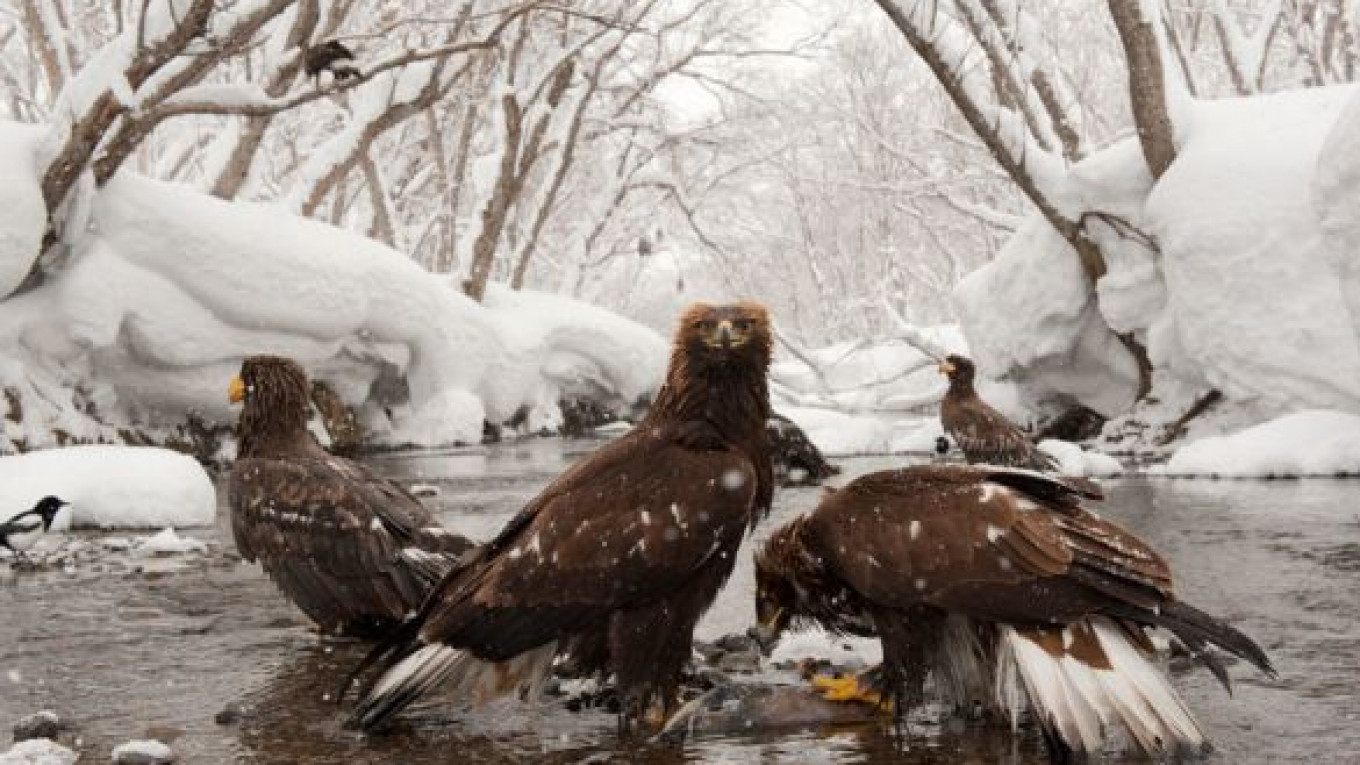Nikolai Zinovyev thinks you have to be slightly crazy to be a wildlife photographer.
He should know. The winner of this year's Golden Turtle award for best ornithology photo, Zinovyev has spent the past five years traveling to far-flung parts of the country in search of the perfect shot.
"Animal photographers are slightly mentally ill, I think. You have to be prepared to travel vast distances, spend a vast amount of time in extremely difficult conditions to get a shot," he said.
Zinovyev is one of 13 Russian wildlife photographers whose work is on display around Patriarch's Ponds in central Moscow until Feb. 28 in an exhibition sponsored by packaging giant Tetra Pak.
Animals — and especially birds — like to keep their distance, something others don't always understand.
"I have some friends who hunt, and they say 'come with us and we guarantee you'll be able to photograph hares, boar, bears, whatever.' But they've got this hunter's idea that if you can see an animal a hundred meters off, you can shoot it. Well, you can't photograph it," he said.
Catching the perfect shot often means spending long days staked out in a blind built of ice and snow.
And the condition of the country's wild spaces doesn't make it any easier.
"In other countries, you have reserves that have not been disturbed for hundreds of years, staffers who are properly paid, funded and equipped and legislation that helps them do their job," he said. "In Russia, it's a little bit different."
While his award-winning shot of an endangered fishing owl was taken in the Primorye region, much of his work has been in the South Kamchatka Sanctuary, one of the few reserves in Russia that are doing well.
"A few years ago, it was terrible," he said. "You had gangs of poachers permanently camped in the park, shooting the bears and smuggling their paws and gall bladders to China. The survivors would eat the carcasses, and they became extremely aggressive carnivores. They weren't going to go back to salmon and berries after that."
New management, volunteers and a hefty sum of investment from the federal government — suddenly interested in promoting Kamchatka as an untouched paradise — changed all that. Zinovyev now describes it as a "bear's paradise," where enough generations have passed for the bears and other beasts to have lost both their instinctive fear of humans and taste for cannibalism.
But that success story is an exception.
"I'd like to see the same thing elsewhere," Zinovyev said. "The people working our nature reserves today are doing it out of the goodness of their heart. The salary of a ranger in a national park is about $200 a month. They need equipment and weapons and the ability to support their families."
The wildlife photo exhibition in the city, titled "Forest Story: Winter," is part of Tetra Pak's effort to promote sustainable-sourced forest products. The Bonn-based Forest Stewardship Council, or FSC, issues certificates to logging firms and other companies that can prove that they used sustainably sourced timber.
Russia already has around 30 million hectares of forest under FSC-certified management. Tetra Pak's Moscow factory received certification for using sustainably sourced wood pulp in 2011.
Domestic consumer brands have been slow to take up the promotional opportunity of the FSC logo, however. Last year, Wimm-Bill-Dann's J7 juice became the first Russian brand to carry the logo on its packaging.
PepsiCo, the parent company, says it wants to expand FSC-certification to other Russian brands this year.
Related articles:
A Message from The Moscow Times:
Dear readers,
We are facing unprecedented challenges. Russia's Prosecutor General's Office has designated The Moscow Times as an "undesirable" organization, criminalizing our work and putting our staff at risk of prosecution. This follows our earlier unjust labeling as a "foreign agent."
These actions are direct attempts to silence independent journalism in Russia. The authorities claim our work "discredits the decisions of the Russian leadership." We see things differently: we strive to provide accurate, unbiased reporting on Russia.
We, the journalists of The Moscow Times, refuse to be silenced. But to continue our work, we need your help.
Your support, no matter how small, makes a world of difference. If you can, please support us monthly starting from just $2. It's quick to set up, and every contribution makes a significant impact.
By supporting The Moscow Times, you're defending open, independent journalism in the face of repression. Thank you for standing with us.
Remind me later.






